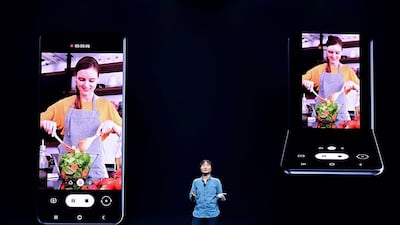Samsung showcased its latest technologies and updates to its software at a two-day developer conference in San Jose.
The SDC19 event sought to display the full potential for Samsung users through the adoption of innovations such as fifth-generation mobile networks, the Internet of Things and intelligence. Here are six of The National's takeaways from the event.
‘Flip’ smartphone — new kid on the block
It was Samsung’s foldable phone that stole the limelight at last year’s developer conference but this year it was a new ‘flip’ phone. The company teased a new foldable concept — not yet named - that looks more like a traditional flip phone. It was shown folding vertically, confirming last month’s media reports that Samsung’s next bendable phone will fold to become a ‘compact’ square.
“This brand-new form factor that we are now exploring will not only easily fit in your pocket, but it also changes the way you use your phone,” said Hyesoon Jeong, head of Samsung’s framework research and development, adding that the idea is to make the phone “more compact”.
Samsung opens doors for third-party TV makers
For the first time, South Korean consumer tech giant is allowing third-party TV makers to use its operating system Tizen. This will attract more manufacturers to Tizen, giving stiff competition to Android TV OS that has become the de facto for the majority of developers.
Consumers will also have the option to turn off advertisement-tracking features in Tizen that is globally supported by popular streaming apps and services such as HBO and Netflix. Samsung TVs accounted for close to one-third of the total shipments worldwide in the second quarter of this year, according to London-based market researcher IHS Markit. It was followed by local rival LG (16.5 per cent) and Japan’s Sony (8.8 per cent).
Bixby becomes smarter
Samsung announced enhanced capabilities for Bixby, its artificial intelligence platform, to help developers and consumers finish tasks more quickly and easily. Newly introduced Bixby templates will allow developers to create solutions using pre-existing forms and they don’t need to start from scratch. Besides, enhanced Bixby apps will let developers build solutions that go beyond smartphones — to televisions, tablets, smart watches and refrigerators.
Latest update for Android devices
Samsung announced a newest update to the software overlaying Android devices. Named One UI 2, the new update was released through a video with some depiction of basic features. It will streamline different apps and ensure smooth functioning of the device while using them simultaneously. Dark mode is also enhanced to offer an improved viewing experience in low-light environments and be less tiring to look at for screen-weary eyes. Dark Mode has a technical aspect as well: the darker hues burn up less battery giving more juice to the user.
Offering end-to-end security
Using emerging technologies, such as IoT, AI and 5G, Samsung has announced new tools and programmes to deliver secure and reliable solutions. To give both developers and users peace of mind, Samsung is offering the Knox SDK software, allowing partners and app developers to integrate advanced security solutions to their apps and services.
“Knox is built around hardware root of trust, not just implemented after the device is built … giving it a foundation like no other security system in the market,” said Seungyun Lee, principal engineer, Knox platform for enterprise at Samsung.
Joining forces with IBM
With American tech giant IBM, Samsung announced a new platform leveraging latest cloud and AI capabilities. Built on the IBM cloud, the new platform will allow clients to track a worker’s vitals, including heart rate and physical activity, to determine if the person is in distress and automatically dispatch help. This is designed to improve the work environments for police officers, fire fighters and other first responders.


